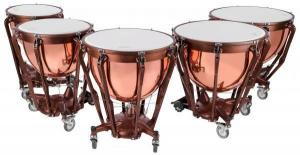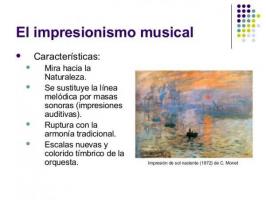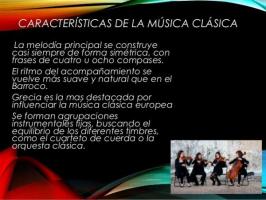Instruments of the Modern Age
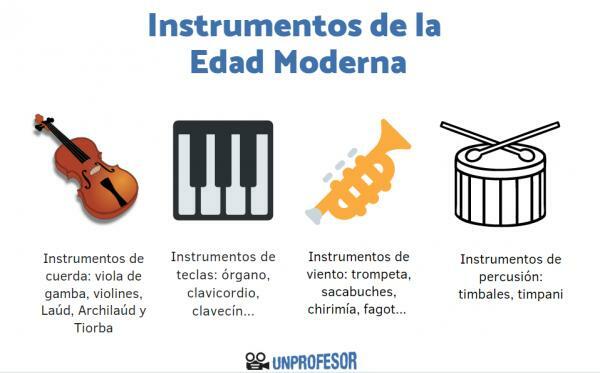
Our inventions change as our needs change and this is how we go perfecting the tools we require to meet our objectives, in this case, the expression artistic musical. In this lesson from a TEACHER we will talk about instruments of the modern age, a time that went through several changes, including the establishment of the classical orchestra.
Index
- Music in the Modern Age
- String Instruments of the Modern Age
- Wind instruments of the Modern Age
- Key Instruments
- Percussion instruments of the Modern Age
Music in the Modern Age.
The Modern age understands the time in history during the XV, XVI, XVII and XVIII centuries, approximately from the discovery of America (1492) to the French Revolution (1789).
Because this is a long period, we can specify that the music of the modern age encompasses the renaissance music (s. XV and XVI), baroque(s. XVII and XVII) and the beginning of the transition to the music of the classicism(s. XVIII). Be careful not to confuse the music of the Modern Age with modernist music.
Musically during this period great advances are made, developing the techniques of polyphony and counterpoint and establishing the forms and structure of the classical symphony orchestra.

Image: Slideshare
String instruments of the Modern Age.
We begin by knowing the instruments of the Modern Age talking about those that are included within the category of string instruments. The best known are the following.
Lute, Archlute and Theorbo
They are predecessor instruments of the guitar with double strings, resonance box and neck, of the plucked string category. The lute was used primarily as a solo instrument and was frequently played at home and with the family. On the other hand, the archlute and the theorbo have a larger size and additional strings for the low notes.
Gamba Viola
It is an instrument of category of bowed stringed string, forerunner of the viola. It had 6 strings and frets on the neck. It was used as a solo instrument as well as in groups and for improvisations.
Violin family
We refer to the viola, the cello and the double bass, plus the addition of the violin, which originally emerged as an alternative to the viola. These are categorized as rubbed string instruments, also by a bow and vary in tessitura and size. They are a crucial part of the orchestras.
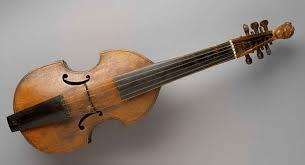
Image: Taringa
Wind instruments of the Modern Age.
We are now going to know the instruments of the Modern Age that are included within the category of wind instruments. The most popular are the following.
The recorder
The one we currently know as the recorder. Despite originating in the Middle Ages, its popularity increased and remained during the Renaissance. It is blown through one end called a nozzle, which is bevelled. Its body has holes that are covered with the fingers to change notes.
The cornet or cornet
It is important not to confuse it with the current cornet, which is a different instrument. Its shape resembles a horn. This one in contrast was made of wood and was used during the Middle Ages and the Baroque. Its mouthpiece is cup-shaped and has holes in the body.
The natural trumpet and the natural horn
They are the ancestors of the trumpet and the French horn that we know today. These are the respective versions used in the orchestra during the Baroque period, which lacked valves (the buttons or levers to activate the change of notes).
Sacabuches
It is the predecessor of the current trombone. Like the one we know, the sackbut was made of metal and had a bar capable of sliding for the change of notes.
The shawm
Similar to today's oboe, as it also has a double reed. It has 9 side holes on its body to change notes.
The bassoon and the bassoon
The bassoon is the predecessor of the bassoon, used during the Renaissance. The bassoon later came to replace it during the Baroque period. They are woodwind instruments, in charge of the low tessitura (the low tones).

Image: Slideshare
Keys instruments.
Among the instruments of the Modern Age we must also highlight those with keys, that is, those that have a mechanism that is operated by means of keys. These instruments that we will talk about now are the predecessors of what we know today as the piano.
The harpsichord or harpsichord
It is characterized because its mechanism works by pressing its internal strings. It used to be a popular instrument in the homes of noble and bourgeois families. He was also part of the baroque orchestra. Its smaller version is called virginal or spinet.
Harpsichord
Unlike the harpsichord, the harpsichord has a striking string mechanism, like the piano we know. It has hammers to hit its strings, actuated by the keys. In contrast, the harpsichord was used less frequently than the harpsichord as its sound was much weaker.
The organ
It is a wind instrument but operated with keys, of great size, usually used in churches. Instead of strings, it has metal tubes to conduct air. The organ was used mainly to accompany the mass and vocal polyphony.
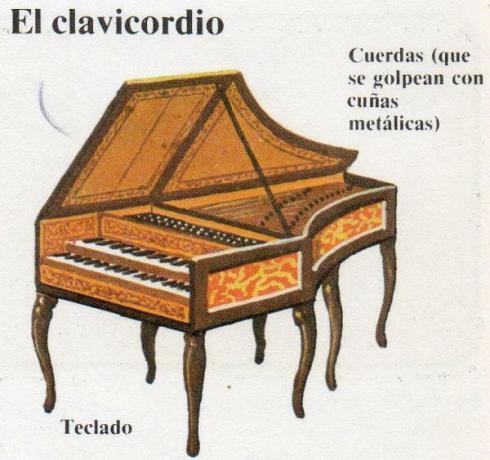
Image: Horadelrecreo
Percussion instruments of the Modern Age.
The tympani or timpani sThey are drums made of copper with membranes that are usually played in pairs (or in greater numbers today) and that produce a very resonant sound. They are used as part of the orchestra. Although they did not previously possess a specific tuning, changes were made during the 16th century that allowed for this new feature.
Now that you know more about the instruments of the Modern Age We encourage you to listen to more of the music of this era so you can hear the wonderful works that they produced back then.

If you want to read more articles similar to Instruments of the Modern Age, we recommend that you enter our category of Musical instruments.

